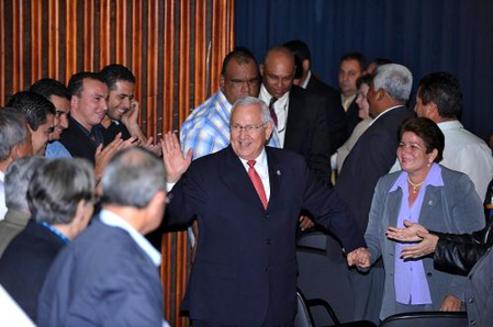He had sought to revise the constitution through a referendum to allow him to seek another term, which aroused strong opposition from the parliament, the army and the supreme court.
 |
|
Honduras' congressional leader Roberto Micheletti, in the middle, is sworn in as the country's new President at the National Congress in Tegucigalpa, Sunday, June 28, 2009. [Xinhua]
|
Honduras' Presidency Minister Enrique Flores Lanza said on Sunday the cabinet was launching a campaign of "peaceful civil resistance" to bring President Manuel Zelaya back to office.
"We are making a call and talking with patriotic leaders in Honduras, because we will begin a peaceful civil resistance in whole country," said the minister.
"People of the country are demonstrating to oppose the attack on democracy," he said.
Local media said eight ministers, including Foreign Minister Patricia Rodas, have been detained, but gave no further details.
Officials from the military told Xinhua Sunday morning that the armed forces have controlled the main roads in the capital and cut off traffic links with the outside.
Few people could be seen on most of the streets in Tegucigalpa, and stores and shopping malls were closed.
Several countries as well as regional and international organizations denounced the military coup and called for a respect for the rule of law in the country.
Venezuelan President Hugo Chavez said if a new Honduran government is sworn in after the coup, he will "bring them down." He said if Venezuela's envoy to Honduras was harmed or troops entered the Venezuelan embassy, "we would have to act militarily."
Cuba condemned the military coup and demanded Zelaya's immediate return to office. "I denounce the criminal, brutal character of this coup," said Cuban Foreign Minister Bruno Rodriguez.
Ecuador described the event as "violating the most basic rules for democratic coexistence and international law."
The Organization of American States (OAS) condemned the coup and called for the immediate reinstallation of Zelaya during an extraordinary session on Sunday. OAS Secretary General Jose Miguel Insulza said the move was "a serious upset to the continent's democratic process."
The European Union issued a unanimous condemnation of the coup and echoed the OAS' call for Zelaya's return to power.
Immediately after the coup, US president Barack Obama called for all actors in Honduras to "respect democratic norms, the rule of law and the Pan-American Democratic Charter."
A US presidential spokesman said the nation would only recognize Zelaya as Honduran president and denied any US involvement in the coup.
The Bolivarian Alternative for the Americas (ALBA) condemned the coup and called an extraordinary meeting in Nicaragua to discuss the matter.
(Xinhua News Agency June 29, 2009)